- Home
- Lisa Kleypas
Suddenly You Page 4
Suddenly You Read online
Page 4
“Amanda,” he said gruffly, “I don’t trust myself with you any longer. I have to leave while I’m still able.”
Amanda was stunned by the dream-swept, faraway sound of her own voice when she replied. “Stay with me. Stay all night.”
Jack threw her a wry glance, and she saw the flush that lingered on his cheekbones. Continuing to cradle her hand, he stroked his thumbs over her palm as if rubbing in the kiss he had placed there. “I can’t.”
“Is it…do you have another…engagement?” she asked tentatively, while a horrible feeling swept through her at the thought of him going from her arms to another woman’s.
He laughed shortly. “Good God, no. It’s just—” He broke off and gave her a moody, contemplative glance. “You’ll understand soon.” Bending over her, he brushed kisses on her chin, her cheek, her closed eyelids.
“I—I won’t send for you again,” she said uneasily while he reached for a nearby lap blanket and draped it over her.
Amusement curled richly in his voice. “Yes, I know.”
She kept her eyes closed, listening to the rustling of clothing as he dressed himself before the fire. Floating on currents of shame and pleasure, she tried to consider all that had happened to her this evening.
“Good-bye, Amanda,” he murmured, and then he was gone, leaving her disheveled and half dressed in the firelight. She kept the soft cashmere blanket over her bare shoulders, her hair coiling over her body and the arm of the settee.
Senseless ideas occurred to her…she wanted to visit Gemma Bradshaw and ask questions about the man she had sent. She longed to know more about Jack. But what purpose would that serve? He occupied a different world from hers: a sordid, secretive world. There was no possibility of a friendship with him, and although he had not taken money from her this time, he certainly would the next. Oh, she had not expected to feel this way, so guilty and yearning, her body still throbbing with delight, her skin tingling as if silk veils were being stroked over her. She thought of his finger reaching inside her, his mouth teasing her breast, and she pulled the blanket over her face with a mortified groan.
Tomorrow she would carry on with the rest of her life, just as she had vowed. But the rest of the night she would let herself drift in fantasies of the man who, already, was becoming more of a dream-figure than a real being.
“Happy birthday,” she whispered to herself.
Chapter 3
After the death of Amanda’s father, the decision to move to London had not been difficult. She could easily have stayed in Windsor. It was only about twenty-five miles from town and also harbored a few notable publishers. She had always lived in Windsor, and both her older sisters’ families were located nearby, and the small but comfortable Briars House had been left to her in her father’s will.
After her father’s funeral, however, Amanda had sold the place promptly, drawing howls of protest from her sisters, Helen and Sophia. They had all been born in that house, the sisters told her angrily, and she had no right to sell a vital part of the family history.
Amanda had received the criticism with outward patience, but she had concealed a grim smile as she reflected that she had earned the right to do as she liked with the place. Perhaps Helen and Sophia still cherished a fondness for the house, but for five years it had been a prison to her. Her sisters had married and moved into homes of their own, while Amanda had remained with her parents and nursed each through their last illnesses. It had taken her mother three years to die of consumption, a slow and messy and singularly unpleasant process. And afterward came her father’s long decline, fueled by various complaints that had led him to waste away to nothing.
Amanda had borne the load entirely on her own. Her sisters had been too busy with their own families to offer any assistance, and most friends and relatives had assured themselves that Amanda was competent to handle everything unaided. She was a spinster—what else was there for her to do?
One well-meaning aunt had even told Amanda of her belief that the Lord had kept her from marrying solely to provide someone to take care of her ailing parents. Amanda would have preferred the Almighty had made other arrangements. Apparently it had not occurred to anyone that Amanda might have caught a husband, had the remaining years of her youth not been expended in caring for her mother and father.
The years had been difficult emotionally and physically. Her mother, who had always been sharp-tongued and difficult to please, had suffered the ravages of consumption with a quiet dignity that had amazed Amanda. Near the end, her mother had been more loving and gentle-natured than Amanda could ever remember, and the day of her passing had been a wrenching one.
Her father, by contrast, had changed from a cheerful man to the most exasperating patient imaginable. Amanda ran constantly to fetch things for him, to prepare meals that he never failed to criticize, to satisfy hundreds of querulous demands that kept her too busy to do anything for herself.
Rather than allow herself to be poisoned with her own frustration, however, Amanda had started to write in the late evenings and early mornings. It had begun merely as a way to entertain herself, but with each page she had hoped her novel might be worthy of publication.
With two books published and both her parents gone, Amanda was free to do as she pleased. Her last years would be spent in the busiest, largest city in the world, among the million and a half people who populated it. Using the two thousand pounds left to her in her father’s will, as well as the money from the sale of the house, Amanda took a small but elegant town house on the west side of London. She brought the two family servants with her—the footman, Charles, and a housemaid, Sukey—and hired a cook, Violet, once they arrived.
London was everything she had hoped it would be, and more. Now, after six months of living in the city, Amanda still awakened each morning with a sense of pleased surprise. She loved the dirt and clutter and bewildering fast pace of London, the way each day began with the raucous cries of street vendors outside and ended with the sounds of carriages and hacks rattling across the cobblestones to convey people to their evening pursuits. She loved the fact that on any night of the week she could attend one of many supper-parties, private dramatic readings, or literary discussions.
To her surprise, she was a recognizable figure in the literary culture of London. Many publishers, poets, journalists, and other novelists seemed to know her name, and to have read her work. Back in Windsor, acquaintances had regarded her writing as frivolous. Certainly no one had approved of the kind of novels she wrote, hinting that they were too vulgar for decent folk to read.
Amanda herself couldn’t understand why her writing was so different from her own personality. Her pen seemed to take on a life of its own when she sat before a sheaf of blank parchment paper. She wrote about characters unlike any people she had ever known…sometimes violent, brutal, always passionate; some who came to ruin and some who even triumphed in spite of their own lack of morality. Since she had no actual pattern on which to base these fictional characters, Amanda realized that their feelings, their passions, could only have come from inside herself. If she allowed herself to dwell on this notion, she could easily become alarmed.
Silver-fork novels, Jack had mentioned to her…she had read many of these, stories of privileged people that detailed their extravagant lifestyles, their romances, the clothes and jewels they wore. However, Amanda knew so little about the upper class that she couldn’t have written a silver-fork novel if her life depended on it. Instead, she wrote about country people, workingmen and clergy, officers and rural squires. Fortunately, her stories seemed to resonate with readers, and the sales of her books were brisk.
A week after her birthday, Amanda accepted an invitation to attend a supper-party at the home of Mr. Thaddeus Talbot, a lawyer who handled negotiations and legal questions for authors. Amanda found him to be the most cheerfully self-indulgent person she had ever known. He spent, drank, and smoked to excess, gambled and went skirt-chasing, and generally seemed to
have a wonderful time. His supper-parties were always heavily attended, as guests were always assured of huge platters of food, copiously flowing wine, and a jovial atmosphere.
“I’m glad yer going out this fine night, Miss Amanda,” Sukey, her maid, commented as Amanda checked her appearance in the entrance hall looking glass. The middle-aged woman, with her small, elfin build and lively nature, had served in the employ of the Briars family for years. “‘Tis a wonder ye didn’t come down with the megrims after all the writing ye’ve done this week.”
“I had to finish my novel,” Amanda replied with a slight smile. “I didn’t dare show my face anywhere, in case Mr. Sheffield should hear reports of my gallivanting about town while there was work to be done.”
Sukey snorted in amusement at the mention of Amanda’s publisher, a dour and serious-minded man who constantly worried that his small stable of writers would get caught up in London’s social whirl and neglect their writing. Truth be told, it was a valid concern. With all the amusements the city offered, it would be quite easy to forget one’s obligations.
Glancing at the long, narrow window by the doorway and noting the icy frost that clung to the glass panes, Amanda shivered and gazed forlornly toward her cozy parlor. Suddenly she longed to put on one of her comfortable old gowns and spend the evening reading by the fire. “It looks horribly cold outside,” she commented.
Sukey hurried to fetch her mistress’s black velvet evening cloak, her animated chatter filling the tiny entrance hall. “Never ye mind the cold, Miss Amanda. There’s time enough for ye to spend yer days and nights before the hearth when ye’re too old and frail to stand the winter breeze. These are the days when ye must make merry with yer friends. What’s a bit of a chill?…I’ll have coals in the warming pan and a glass of hot brandy-milk waiting fer ye on yer return.”
“Yes, Sukey,” Amanda replied dutifully, smiling at the maid.
“And, Miss Amanda,” the maid dared to instruct her, “ye might try to curb yer tongue a bit when ye’re around the gentlemen. Just flatter them, and smile, and mayhap look as though ye agree with all their gabbing about politics and such—”
“Sukey,” Amanda interrupted wryly, “you’re not still harboring hopes that I’ll marry someday, are you?”
“It could happen, sure enow,” the maid insisted.
“I’m not going to the supper-party for any reason other than the need for companionship and conversation,” Amanda informed her. “Certainly not for husband-hunting!”
“Aye, but ye do look fine tonight.” Sukey’s approving glance swept over Amanda’s black evening dress, made of shimmering crinkled silk that had been cut very low across the bosom and fitted tightly to her voluptuous shape. Rows of glittering jet beads adorned the bodice and long sleeves, while her gloves and shoes were of soft black chamois leather. It was a sophisticated ensemble, one that made the most of Amanda’s looks and generously displayed her bosom. Although Amanda had never dressed in a particularly stylish way before, she had recently consulted with a reputable London dressmaker and ordered many fashionable new gowns.
With Sukey’s help, Amanda shrugged into the ermine-lined cloak, slipped her arms through the silk-trimmed armholes, and fastened the gold clasp at the throat. They settled a large Parisian hat, made of black velvet and lined with pink silk, carefully over her coiffure. At Sukey’s suggestion, Amanda had decided to wear her hair in a new style this evening, with several curls spilling from a loose-braided topknot.
“I vow ye’ll catch a husband yet,” Sukey insisted. “Mayhap ye’ll even meet him tonight.”
“I don’t want a husband,” Amanda said crisply. “I prefer my independence.”
“Independence,” Sukey exclaimed, raising her gaze heavenward. “Ye’d like a husband in yer bed a sight better, I ‘spect.”
“Sukey,” Amanda remarked in disapproval, but the maid only laughed, daring to speak freely because of her age and long familiarity.
“I warrant ye’ll catch a finer man than either of yer sisters, bless them both,” Sukey predicted. “The best things come to those who wait, I always say.”
“Who would dare to contradict you?” Amanda commented wryly, and squinted at the sudden freezing blast of air as the footman, Charles, opened the door for her.
“Carriage is ready, Miss Amanda,” he said cheerfully, a lap blanket folded neatly over his arm. He escorted her to the old but well-kept family carriage, settled her inside, and draped the blanket over her.
Leaning back against the worn leather upholstery, Amanda huddled beneath the length of silk-fringed wool and smiled at the thought of the supper-party to come. Life was very good, she thought. She had friends, a comfortable home, and an occupation that was not only interesting but profitable. In spite of her good fortune, however, she had been annoyed by Sukey’s insistence that she should find a husband someday.
There was no room for a man in Amanda’s life. She liked being able to act and speak with no checks on her freedom. The notion of a husband whose legal and social authority completely eclipsed her own…intolerable. In any disputes that arose between them, the last word would be his. He could take away all her earnings if he chose. And any children they might have would be considered his property. Amanda knew that she could never willingly give another person such power over herself. It wasn’t that she disliked the male sex. On the contrary, she thought them rather clever for having arranged things so clearly to their advantage.
And yet…how nice it would be to attend parties and lectures with a beloved companion. Someone to talk and argue and share with. Someone to share her meals, and cuddle in bed to keep the winter chill away. Yes, independence was the best path, but it wasn’t always the most comfortable one. Everything came with a price, and she had bought her autonomy with a good amount of loneliness.
The memory of what had occurred only a week ago was still at the forefront of her mind, despite her best efforts to set it aside. “Jack,” she whispered, one hand creeping to the center of her chest, where a wistful ache had settled. Impressions of him still lingered in her memory: the unearthly blue of his eyes, the richly frayed timbre of his voice. For some women, a romantic evening was an ordinary occurrence, but for her, it had been the most extraordinary experience of her life.
The moment of wistful reflection dissolved as her carriage rolled to a halt in front of Mr. Talbot’s house, an attractive red brick structure with white columns. Its three stories were set on a perfect little garden square, and resonated with light, laughter, and social chatter. As might be expected of a successful lawyer, Talbot’s home was elegant. The entrance hall was a charming oval with plastered copses on either end, and the large receiving room beyond was painted a soothing shade of light green, its elaborate plasterwork ceiling reflected on the gleaming, dark oak floors below. Pleasing smells filled the air, promising a fine repast, while the clinks of glassware provided a sparkling musical undertone to the strains of a string quartet.
The central block of rooms was crowded, and Amanda nodded in greeting as various smiling faces turned toward her. She had an awareness of being popular in the manner that a favorite great-aunt might be…often she was slyly teased about this gentleman or that, although no one had any real belief that she entertained any romantic interests. She was fixed far too firmly “on the shelf” for that.
“My dear Miss Briars!” a robust masculine voice exclaimed, and she turned to see the hearty, cheerfully ruddy countenance of Mr. Talbot. “At last the evening holds true to its promise…it wanted only you to be complete.”
Although Talbot was at least ten years her senior, he possessed an eternally boyish quality that belied his distinctive shock of long white hair. His fleshy cheeks bulged with a mischievous grin. “And how attractive you are tonight,” he continued, taking her hand and pressing it between his chubby palms. “You put all the other ladies to shame.”
“I am accustomed to your easy flattery, Mr. Talbot,” Amanda informed him with a smile. “And I am far
too sensible to fall prey. You’d do better to direct your pleasing words to some unfledged girl who will prove far more gullible.”
“You are my preferred target, however,” he said, and she rolled her eyes and again smiled at him.
Taking Talbot’s proffered arm, Amanda accompanied him to a massive mahogany sideboard, flanked by two large silver urns, one steaming with hot rum punch and the other filled with cold water. Talbot made a great show of directing a servant to fill a goblet of punch for her.
“Now, Mr. Talbot, I insist that you attend to your other guests,” Amanda said, letting the spicy aroma of the punch fill her nostrils. She relished the warmth that seeped through the glass goblet. Despite the thin covering of her gloves, her fingers were cold. “I see several people I wish to speak with, and you will hinder my progress.”
Talbot laughed jovially at the mock reprimand, and took his leave of her with a deep bow. Sipping her steaming punch, Amanda surveyed the crowd. Authors, publishers, illustrators, printers, lawyers, and even a critic or two—all mingled, separated, and regathered in constantly shifting groups. Conversation rippled through the room, punctuated by frequent bursts of laughter.
“Amanda, dear!” came a light, silvery voice, and Amanda turned to greet an attractive blond widow, Mrs. Francine Newlyn. Francine was the successful author of a half-dozen “sensation” novels, stories of high drama that often involved bigamy, murder, and adultery. Although Amanda privately considered Francine’s books a bit overwrought, she enjoyed them nevertheless. Slim, feline, and a lover of gossip, Francine made it a point to cultivate friendships with any writers she deemed successful enough to be worthy of her attention. Amanda always relished her conversations with the woman, who seemed to know everything about everyone, but she was also cautious not to tell Francine anything she wouldn’t care to be embellished and repeated.
“Dear Amanda,” Francine purred, her slender gloved fingers curved daintily around the heavy stem of a goblet, “how nice to see you here. You may be the only person of good sense to have walked through the door so far.”

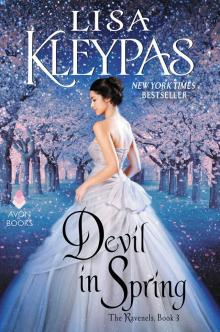 Devil in Spring
Devil in Spring Sugar Daddy
Sugar Daddy Devil in Winter
Devil in Winter Dreaming of You
Dreaming of You Christmas Eve at Friday Harbor
Christmas Eve at Friday Harbor Love, Come to Me
Love, Come to Me Only With Your Love
Only With Your Love Suddenly You
Suddenly You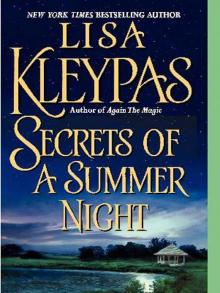 Secrets of a Summer Night
Secrets of a Summer Night Cold-Hearted Rake
Cold-Hearted Rake Where's My Hero?
Where's My Hero? Gifts of Love
Gifts of Love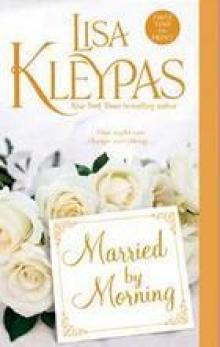 Married by Morning
Married by Morning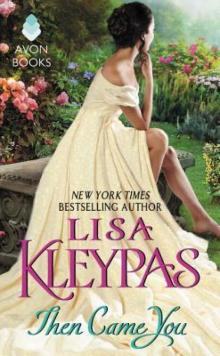 Then Came You
Then Came You Wish List
Wish List Where Dreams Begin
Where Dreams Begin A Historical Christmas Present
A Historical Christmas Present Somewhere I'll Find You
Somewhere I'll Find You Scandal in Spring
Scandal in Spring Someone to Watch Over Me
Someone to Watch Over Me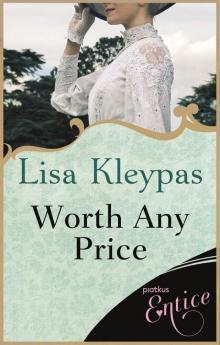 Worth Any Price
Worth Any Price Prince of Dreams
Prince of Dreams It Happened One Autumn
It Happened One Autumn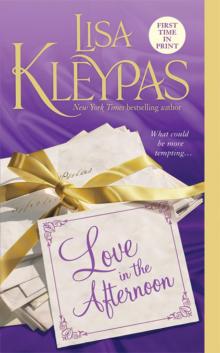 Love in the Afternoon
Love in the Afternoon Devil's Daughter
Devil's Daughter A Wallflower Christmas
A Wallflower Christmas Tempt Me at Twilight
Tempt Me at Twilight Brown-Eyed Girl
Brown-Eyed Girl Mine Till Midnight
Mine Till Midnight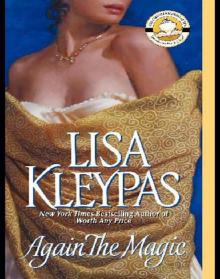 Again the Magic
Again the Magic Lady Sophia's Lover
Lady Sophia's Lover Because You're Mine
Because You're Mine Midnight Angel
Midnight Angel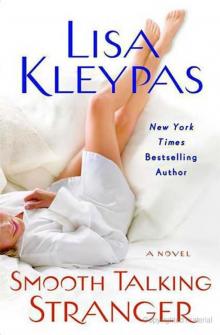 Smooth-Talking Stranger
Smooth-Talking Stranger Blue-Eyed Devil
Blue-Eyed Devil Hello Stranger
Hello Stranger Dream Lake
Dream Lake Devil's Daughter: The Ravenels Meet the Wallflowers
Devil's Daughter: The Ravenels Meet the Wallflowers A Christmas to Remember
A Christmas to Remember Smooth Talking Stranger
Smooth Talking Stranger Crystal Cove
Crystal Cove Marrying Winterborne
Marrying Winterborne Stranger in My Arms
Stranger in My Arms Devil in Disguise
Devil in Disguise Worth Any Price bsr-3
Worth Any Price bsr-3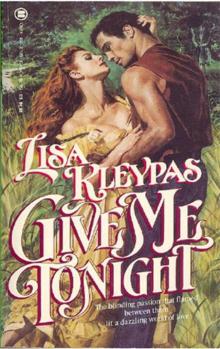 Give Me Tonight
Give Me Tonight Rainshadow Road fh-2
Rainshadow Road fh-2 Seduce Me At Sunrise
Seduce Me At Sunrise I Will
I Will Someone to Watch Over Me bsr-1
Someone to Watch Over Me bsr-1 Lady Sophias Lover bsr-2
Lady Sophias Lover bsr-2 A Hathaway Wedding
A Hathaway Wedding A Hathaway Wedding (Hathaways Bk2.5)
A Hathaway Wedding (Hathaways Bk2.5) Worth Any Price - Bow Street 3
Worth Any Price - Bow Street 3 Christmas with Holly
Christmas with Holly